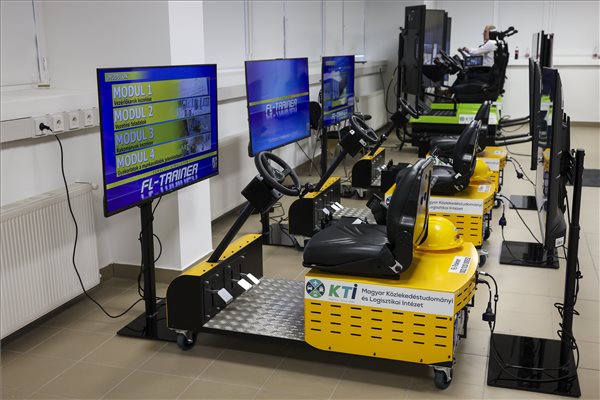The Deputy State Secretary of the Ministry of Culture and Innovation emphasized the pivotal role of vocational training in meeting labor market demands, during the closing event of the “Transport Training and Examination Center” project.
Gáborné Pölöskei underscored the project’s significance in addressing workforce shortages in the transport sector, positioning it as a priority in vocational training. The center aims to offer short-term courses fostering skills and competences aligned with labor market needs.

Gáborné Pölöskei. Photo: MTI / Hegedüs Róbert
Explaining further, she highlighted the project’s potential to serve as a model for future developments, with its procedures, tools, and systems supporting skills development. She acknowledged the evolving job landscape, emphasizing the importance of providing training opportunities for emerging professions while acknowledging the diminishing relevance of some existing ones.
Describing vocational education and training as a gateway to higher education,
the Deputy State Secretary saw the project as a valuable avenue to align vocational training with labor market demands.
The transport sector, one of the nine major industrial sectors, underwent comprehensive development within the 2018-launched project. The initiative produced 700 digital learning materials, reflecting a shift towards adaptable content, aligning with dynamic needs and an ever-changing environment.
András Mayer, Managing Director of the Hungarian Institute for Transport Science and Logistics (KTI), highlighted the collaborative efforts with the National Institute of Vocational and Adult Education in establishing the examination center. He emphasized the sector’s selection due to a substantial shortage of human resources.

Simulator in the training center. Photo: MTI / Hegedüs Róbert
Gábor Oláh, Director of Training and Examinations at KTI, detailed the project, emphasizing the role of methodological development and simulators.
These tools, he noted, enhance economic efficiency in education, with virtual teaching tools proving 30-50% more effective in learning.
The project, executed within the Széchenyi 2020 program, received over HUF 6.5 billion (EUR 17M) in non-reimbursable EU funding and HUF 827 million (EUR 2.1M) in co-financing from the Hungarian government. Notably, more than 17,000 individuals, including over 5,000 vocational students and 12,000 transport sector workers, have undergone modern training as a result.
Related article
Minister of Innovation Promotes Vocational Training
Training programs with the support of the Hungarian government will start in Târgu Secuiesc, Romania in the autumn.Continue reading
Via MTI; Featured Image: MTI / Hegedüs Róbert

